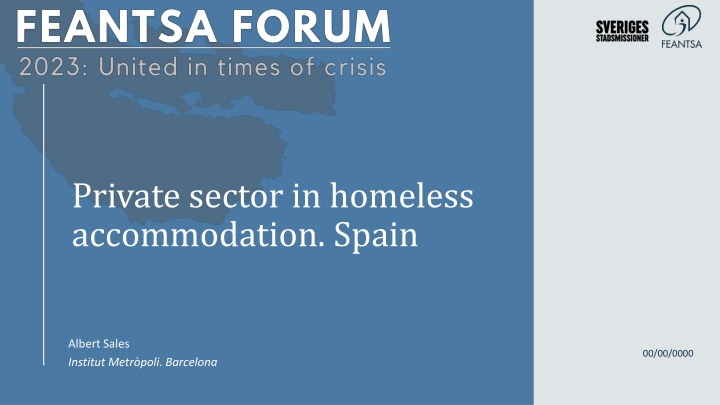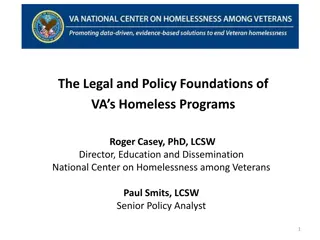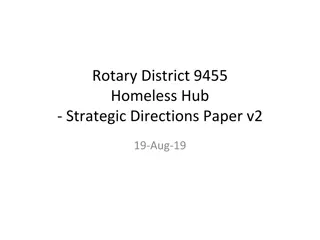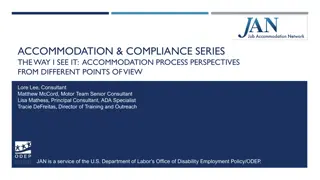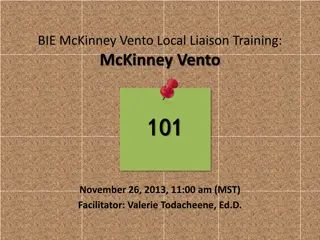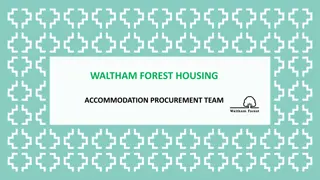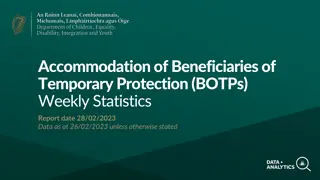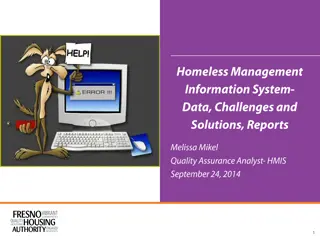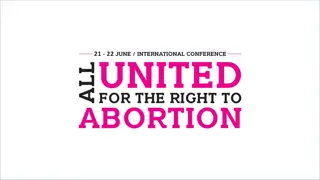Private Sector in Homeless Accommodation in Spain
Homeless services in Spain have evolved over the years with the introduction of the first Social Services law in 1985. Initially managed by non-profit and religious organizations, the sector has witnessed an increase in for-profit operators managing homelessness facilities through public tenders. The use of hostels and bed and breakfasts to accommodate homeless individuals with public funds has become more common, offering temporary solutions while waiting for social housing.
Download Presentation

Please find below an Image/Link to download the presentation.
The content on the website is provided AS IS for your information and personal use only. It may not be sold, licensed, or shared on other websites without obtaining consent from the author.If you encounter any issues during the download, it is possible that the publisher has removed the file from their server.
You are allowed to download the files provided on this website for personal or commercial use, subject to the condition that they are used lawfully. All files are the property of their respective owners.
The content on the website is provided AS IS for your information and personal use only. It may not be sold, licensed, or shared on other websites without obtaining consent from the author.
E N D
Presentation Transcript
Private sector in homeless accommodation. Spain Albert Sales Institut Metr poli. Barcelona 00/00/0000
Contents 1. Context: Homeless services in Spain 2. The growing presence of for profit operators 3. Companies managing homelessness services 4. Hostels and bed and breakfasts 5. Some information about Barcelona 6. Private sector vs. NGO? 7. Conclusions FEANTSA FORUM 2023 2 00.00.00
Contribution to the international comparative study. The private sector and Emergency and Temporary Accommodation in Spain
Context: Homeless Services in Spain The first Spanish Social Services law was approved in 1985, and for the first time homelessness was recognised as a social services topic. Non-religious organisations were incorporated at the homeless sector. The municipal social services of the big cities began to develop homeless services at the beginning of the 21st century (when the increase in people sleeping rough was evident). New shelters were created and most of the facilities were funded by local authorities and managed by non- profit organisations. The main actors in the homelessness sector in Spain have traditionally been non-profit organisations and, especially, religious organisations. Until the 1990s, housing resources and social services for the homeless were managed almost exclusively by religious orders of the Catholic Church. 00.00.00 FEANTSA FORUM 2023 4
The growing presence of for profit operators Companies managing homelessness facilities through public tenders: Families and individuals living in hostels and bed and breakfasts paid for by public social services as a temporary solution: As the sector becomes more professional, the forms of relationship between public administrations and service providers are diversifying. The extension of the use of the public contract has facilitated the entry of for-profit operators (some of them big companies) that already provided public services in the field of home care or care for the elderly. The use of hostels and Bed & Breakfast to accommodate homeless people with public money has recently spread. There is any explicit political decision. Social services use these establishments to compensate for the growth in the number of homeless people and to offer a temporary solution to evicted families who are waiting for social housing. 00.00.00 FEANTSA FORUM 2023 5
Companies managing homelessness services Shelters, temporary accommodation or housing led programs are usually publicly tendered. For-profit providers are not the majority, but they are increasing their presence competing with non-profit organisations. As the services scaled up, the relationship between local authorities and provider entities became more professional and the award took the form of a public tender. Non-profit organisations continue to run most services and programmes, but some for-profit companies are growing in the sector. (These companies previously managed other social services such as housing for the elderly or home care services, p. ex. Grupo Cinco, Clece). 00.00.00 FEANTSA FORUM 2023 6
Homelessness policies have been cocreated (or coproduced) by public authorities and NGO together through local networks. Private companies act only as service providers and its growing presence is eroding the networking. Although we don t have statistical evidence, labor conditions in privately managed facilities are systematically worse than in the ones managed by non profit. And this is a huge problem in a sector where employment is precarious even when the operators are non-profit. Consequences 00.00.00 FEANTSA FORUM 2023 7
Hostels and bed and breakfasts Municipalities are increasingly using beds and rooms in hostels and bed&breakfasts. They do so both to respond to the loss of housing of families and individuals and the lack of places in shelters and temporary accommodation services for the homeless. The rooms in hostels and bed & breakfasts are also used to temporarily house asylum seekers, migrants in an emergency situation, or women victims of gender violence. Hostels have become a tool to provide a quick response but at a very high personal and economic cost. In large cities, the cause is the saturation of services for homeless people. In medium and small cities, the cause is the absence (or underdevelopment) of service networks for the homeless. Nowadays, big cities such as Barcelona or Madrid have hundreds of families and individuals living in Bed and Breakfast for long periods of time. We estimated the 15% of people living in Hostels will not have any option to access to an independent housing solution. 00.00.00 FEANTSA FORUM 2023 8
This causes a high personal and financial cost. Anti-eviction platforms have denounced the lack of adaptation of hostels and bed & breakfasts to the needs of families. It is not a regulated service in the portfolio of social services and, in consequence there are not quality standards. On average, every person temporarily housed in a Hostel or a Bed&Breakfast in BCN costs the city 2.000 euros per month. In addition, cities with significant tourist pressure are having more and more problems finding available rooms. Barcelona had to tender a search service and, at the moment, a specialized company is looking for hostels and bed&breakfasts for social services. Consequences 00.00.00 FEANTSA FORUM 2023 9
Some information about Barcelona 1.130 rough sleepers (according to data from social services outreach teams) 2.800 people in homeless services facilities (including shelters, transitional housing, housing fist and housing led programmes). Families living in B&B and Hostels monitored by the social services (term average) 00.00.00 FEANTSA FORUM 2023 10
Private sector vs. NGO? What is being done to stop this growth in the enrichment of private actors thanks to the homelessness crisis? The principle of free competition established by the European Public Procurement Directive and the Spanish Law that transposes it, supposes that the suppliers of the public authorities carry out their activity under the same rules. Some public administrations introduce social clauses to favor suppliers consistent with social and environmental sustainability criteria. But the regulatory framework does not allow restricting the contracting of specific services to non-profit organisations. Federations of social organisations are demanding the creation of restricted markets that exclude for-profit companies. The government of Catalonia tried to promote a law that would allow non-profit organisations to be prioritised in the contracting of social services. The proposal was covered by Directive 2014/24/EU, according to the party that presented it. but In February 2020 the proposal was rejected in Parliament. 00.00.00 FEANTSA FORUM 2023 11
Conclusions In my opinion, these types of political battles are necessary. In the same way, it is necessary to have a strong ecosystem of organizations dedicated to homelessness policies. However, I think it is not enough. As long as we continue feeding the policies of reaction to homelessness, private companies will continue to expand their market share and NGOs will enter into a competitive logic (with companies and among themselves). The advocay of homelessness NGOs must not forget that homelessness is a problem of housing and migratory reception.So we cannot settle for maintaining a market share, we must advocate to disappear demanding a powerful prevention framework, fighting against migratory exclusion. 00.00.00 FEANTSA FORUM 2023 12
